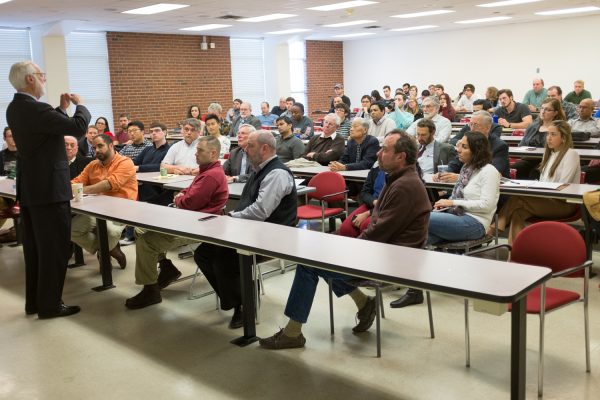Climate Change: An Engineering Grand Challenge for Our Age
Dr. Wayne Clough delivered the 47th annual Shaw Lecture to a standing-room-only crowd in Mann Hall. Clough’s calm and deliberate delivery almost belied the magnitude of his message. He believes that we are in a race to decrease the causes, and mitigate the effects, of climate change. Calling it “a race we have to win,” Clough continued: “Anything less and civilization as we know it will be gone. This is the grand challenge.”
Dr. Clough served as the 10th president of the Georgia Institute of Technology fro 1994 to 2008, and as the 12th Secretary of the Smithsonian from 2008 to 2014. A native of Georgia, he earned his BS and MS degrees from Georgia Tech and a PhD from the University of California at Berkeley. He has taught at Duke, Stanford, and Virginia Tech, where he served as Chair of the Department of Civil and Environmental Engineering and Dean of the College of Engineering.

Clough called for a rethinking of both engineering practice and engineering education as we face increased pressures to stabilize existing infrastructure and build new infrastructure that is resilient to the effects of climate change, including sea level rise and severe weather. “Our friends in the sciences have taken the brunt of this argument for years, and we’ve stood on the sidelines. The science on climate change is in. Now it is an engineering problem, and we are problem solvers,” Clough declared.
Clough reflected on the role of engineers in addressing climate change through the lens of his own experiences, including his four years of service as chair of the National Research Council Committee on New Orleans Regional Hurricane Protection Projects, and his work with hundreds of Smithsonian scientists on matters related to climate change. He emphasized that a multi-disciplinary approach is needed as engineers design the next generation of transportation systems, energy generation, water and food systems, and more. “The good news is you’re going to have lots of work,” Clough said. “The bad news is you probably won’t have enough funding.”
Clough expanded on the challenge to populations living along coasts as sea levels rise. “There will be winners and losers,” he said. “Human problems will be abundant. We already have ‘climate refugees’ in some areas of the world.” Clough explained that alongside the grand engineering challenges are moral and political imperatives, including uncertainties of who will pay for the poor and the sick to be relocated when climate related disasters occur?
“We cannot solve problems with the same thinking that created them,” Clough reminded the audience. He urged engineers to approach everything as a system, and work together with multi-disciplinary solutions instead of isolated approaches. He cited examples such as roads constructed from solar panels; viewing water as infrastructure; increasing access to solar and wind generated energy acquired on agriculturally unproductive land; the use of rooftop gardens; and parking garages built atop underground cisterns. He emphasized that solutions that make sense economically can’t be challenged by even the most avid ‘climate deniers.’
A lengthy Q&A followed Dr. Clough’s remarks with ensuing discussion regarding the role of creating curriculum aimed at giving engineering students the opportunity to study climate change science and develop engineering solutions to the effects of climate change.

Dr. Clough has returned to Georgia and is active as a lecturer and author. He is teaching part-time at Georgia Tech with a focus on leadership, climate change, and working to create access to a university education for students from low-income families.
THE HENRY M. SHAW LECTURE SERIES IN CIVIL ENGINEERING
The Henry M. Shaw Lecture Series in Civil Engineering was established in 1966 by the faculty and friends of Mr. Henry Marchand Shaw, Sr, who was a 1922 graduate in Mechanical Engineering. Shaw had a long and distinguished career in the quarrying, aggregate production, and concrete manufacturing industries.
In 1970 the College of Engineering named Shaw a Distinguished Engineering Alumnus. The lecture honors the late Mr. Shaw, who was president of the North Carolina Products Corporation, for his contributions to the growth of North Carolina and for his interest in the University’s School of Engineering.

